Duties of Directors towards Stakeholders and Corporate Governance
VerifiedAdded on 2023/05/30
|10
|2516
|322
AI Summary
This report analyses the duties of directors towards stakeholders and corporate governance policies. It includes legal director duties, examples of successful corporations, and recommendations for directors to comply with corporate governance principles.
Contribute Materials
Your contribution can guide someone’s learning journey. Share your
documents today.

0
Corporate Governance
Corporate Governance
Secure Best Marks with AI Grader
Need help grading? Try our AI Grader for instant feedback on your assignments.
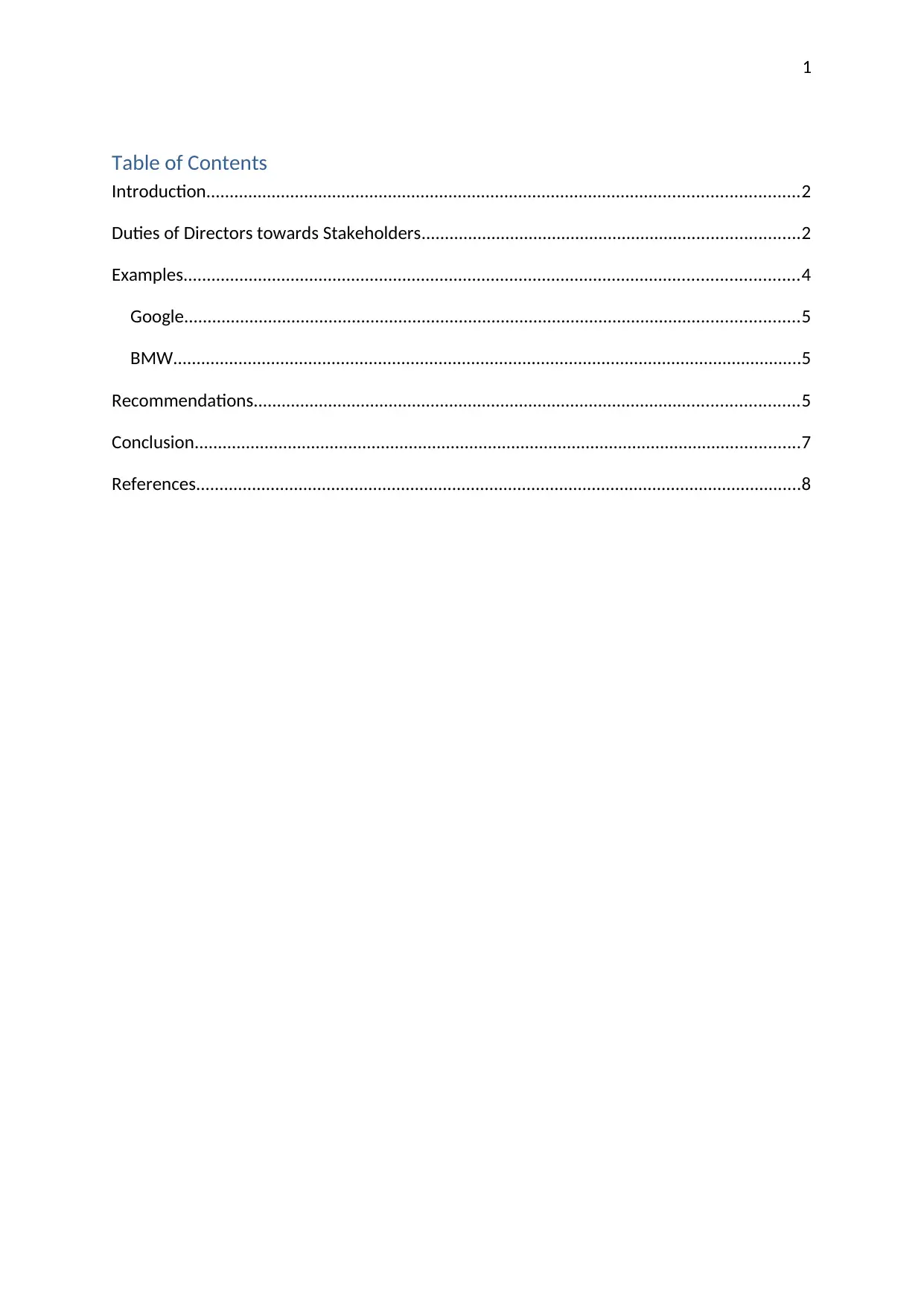
1
Table of Contents
Introduction...............................................................................................................................2
Duties of Directors towards Stakeholders.................................................................................2
Examples....................................................................................................................................4
Google....................................................................................................................................5
BMW.......................................................................................................................................5
Recommendations.....................................................................................................................5
Conclusion..................................................................................................................................7
References..................................................................................................................................8
Table of Contents
Introduction...............................................................................................................................2
Duties of Directors towards Stakeholders.................................................................................2
Examples....................................................................................................................................4
Google....................................................................................................................................5
BMW.......................................................................................................................................5
Recommendations.....................................................................................................................5
Conclusion..................................................................................................................................7
References..................................................................................................................................8
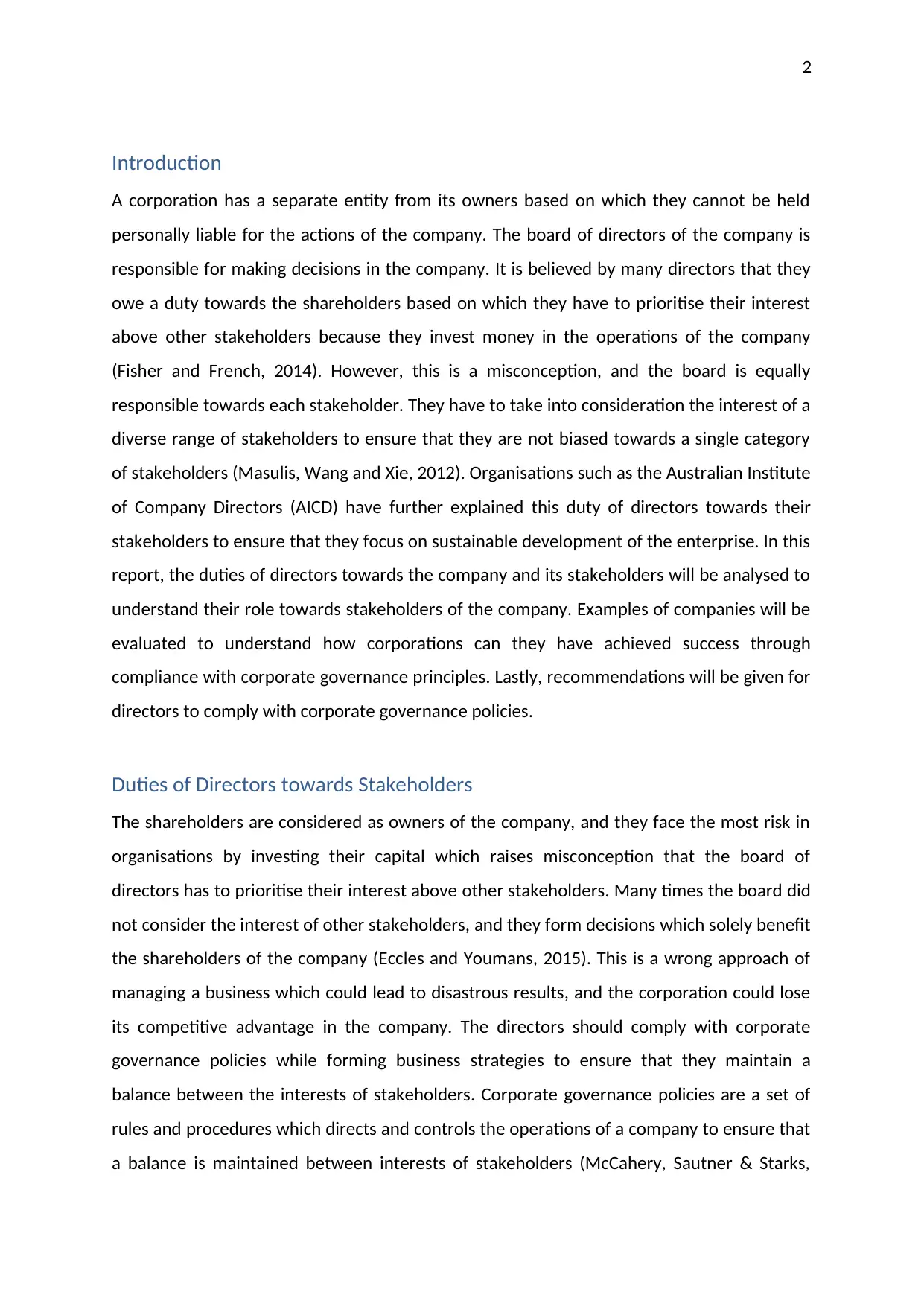
2
Introduction
A corporation has a separate entity from its owners based on which they cannot be held
personally liable for the actions of the company. The board of directors of the company is
responsible for making decisions in the company. It is believed by many directors that they
owe a duty towards the shareholders based on which they have to prioritise their interest
above other stakeholders because they invest money in the operations of the company
(Fisher and French, 2014). However, this is a misconception, and the board is equally
responsible towards each stakeholder. They have to take into consideration the interest of a
diverse range of stakeholders to ensure that they are not biased towards a single category
of stakeholders (Masulis, Wang and Xie, 2012). Organisations such as the Australian Institute
of Company Directors (AICD) have further explained this duty of directors towards their
stakeholders to ensure that they focus on sustainable development of the enterprise. In this
report, the duties of directors towards the company and its stakeholders will be analysed to
understand their role towards stakeholders of the company. Examples of companies will be
evaluated to understand how corporations can they have achieved success through
compliance with corporate governance principles. Lastly, recommendations will be given for
directors to comply with corporate governance policies.
Duties of Directors towards Stakeholders
The shareholders are considered as owners of the company, and they face the most risk in
organisations by investing their capital which raises misconception that the board of
directors has to prioritise their interest above other stakeholders. Many times the board did
not consider the interest of other stakeholders, and they form decisions which solely benefit
the shareholders of the company (Eccles and Youmans, 2015). This is a wrong approach of
managing a business which could lead to disastrous results, and the corporation could lose
its competitive advantage in the company. The directors should comply with corporate
governance policies while forming business strategies to ensure that they maintain a
balance between the interests of stakeholders. Corporate governance policies are a set of
rules and procedures which directs and controls the operations of a company to ensure that
a balance is maintained between interests of stakeholders (McCahery, Sautner & Starks,
Introduction
A corporation has a separate entity from its owners based on which they cannot be held
personally liable for the actions of the company. The board of directors of the company is
responsible for making decisions in the company. It is believed by many directors that they
owe a duty towards the shareholders based on which they have to prioritise their interest
above other stakeholders because they invest money in the operations of the company
(Fisher and French, 2014). However, this is a misconception, and the board is equally
responsible towards each stakeholder. They have to take into consideration the interest of a
diverse range of stakeholders to ensure that they are not biased towards a single category
of stakeholders (Masulis, Wang and Xie, 2012). Organisations such as the Australian Institute
of Company Directors (AICD) have further explained this duty of directors towards their
stakeholders to ensure that they focus on sustainable development of the enterprise. In this
report, the duties of directors towards the company and its stakeholders will be analysed to
understand their role towards stakeholders of the company. Examples of companies will be
evaluated to understand how corporations can they have achieved success through
compliance with corporate governance principles. Lastly, recommendations will be given for
directors to comply with corporate governance policies.
Duties of Directors towards Stakeholders
The shareholders are considered as owners of the company, and they face the most risk in
organisations by investing their capital which raises misconception that the board of
directors has to prioritise their interest above other stakeholders. Many times the board did
not consider the interest of other stakeholders, and they form decisions which solely benefit
the shareholders of the company (Eccles and Youmans, 2015). This is a wrong approach of
managing a business which could lead to disastrous results, and the corporation could lose
its competitive advantage in the company. The directors should comply with corporate
governance policies while forming business strategies to ensure that they maintain a
balance between the interests of stakeholders. Corporate governance policies are a set of
rules and procedures which directs and controls the operations of a company to ensure that
a balance is maintained between interests of stakeholders (McCahery, Sautner & Starks,
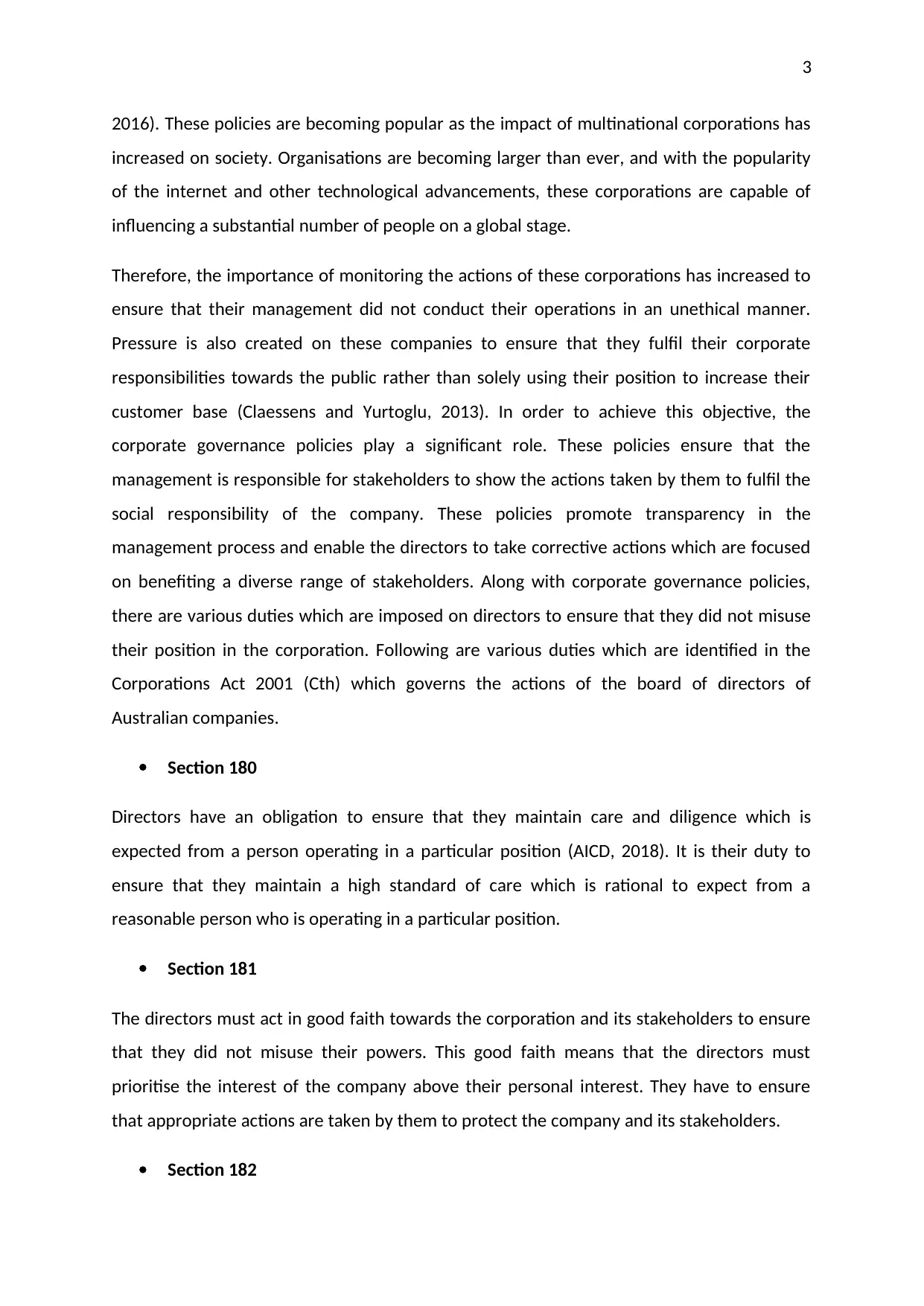
3
2016). These policies are becoming popular as the impact of multinational corporations has
increased on society. Organisations are becoming larger than ever, and with the popularity
of the internet and other technological advancements, these corporations are capable of
influencing a substantial number of people on a global stage.
Therefore, the importance of monitoring the actions of these corporations has increased to
ensure that their management did not conduct their operations in an unethical manner.
Pressure is also created on these companies to ensure that they fulfil their corporate
responsibilities towards the public rather than solely using their position to increase their
customer base (Claessens and Yurtoglu, 2013). In order to achieve this objective, the
corporate governance policies play a significant role. These policies ensure that the
management is responsible for stakeholders to show the actions taken by them to fulfil the
social responsibility of the company. These policies promote transparency in the
management process and enable the directors to take corrective actions which are focused
on benefiting a diverse range of stakeholders. Along with corporate governance policies,
there are various duties which are imposed on directors to ensure that they did not misuse
their position in the corporation. Following are various duties which are identified in the
Corporations Act 2001 (Cth) which governs the actions of the board of directors of
Australian companies.
Section 180
Directors have an obligation to ensure that they maintain care and diligence which is
expected from a person operating in a particular position (AICD, 2018). It is their duty to
ensure that they maintain a high standard of care which is rational to expect from a
reasonable person who is operating in a particular position.
Section 181
The directors must act in good faith towards the corporation and its stakeholders to ensure
that they did not misuse their powers. This good faith means that the directors must
prioritise the interest of the company above their personal interest. They have to ensure
that appropriate actions are taken by them to protect the company and its stakeholders.
Section 182
2016). These policies are becoming popular as the impact of multinational corporations has
increased on society. Organisations are becoming larger than ever, and with the popularity
of the internet and other technological advancements, these corporations are capable of
influencing a substantial number of people on a global stage.
Therefore, the importance of monitoring the actions of these corporations has increased to
ensure that their management did not conduct their operations in an unethical manner.
Pressure is also created on these companies to ensure that they fulfil their corporate
responsibilities towards the public rather than solely using their position to increase their
customer base (Claessens and Yurtoglu, 2013). In order to achieve this objective, the
corporate governance policies play a significant role. These policies ensure that the
management is responsible for stakeholders to show the actions taken by them to fulfil the
social responsibility of the company. These policies promote transparency in the
management process and enable the directors to take corrective actions which are focused
on benefiting a diverse range of stakeholders. Along with corporate governance policies,
there are various duties which are imposed on directors to ensure that they did not misuse
their position in the corporation. Following are various duties which are identified in the
Corporations Act 2001 (Cth) which governs the actions of the board of directors of
Australian companies.
Section 180
Directors have an obligation to ensure that they maintain care and diligence which is
expected from a person operating in a particular position (AICD, 2018). It is their duty to
ensure that they maintain a high standard of care which is rational to expect from a
reasonable person who is operating in a particular position.
Section 181
The directors must act in good faith towards the corporation and its stakeholders to ensure
that they did not misuse their powers. This good faith means that the directors must
prioritise the interest of the company above their personal interest. They have to ensure
that appropriate actions are taken by them to protect the company and its stakeholders.
Section 182
Secure Best Marks with AI Grader
Need help grading? Try our AI Grader for instant feedback on your assignments.
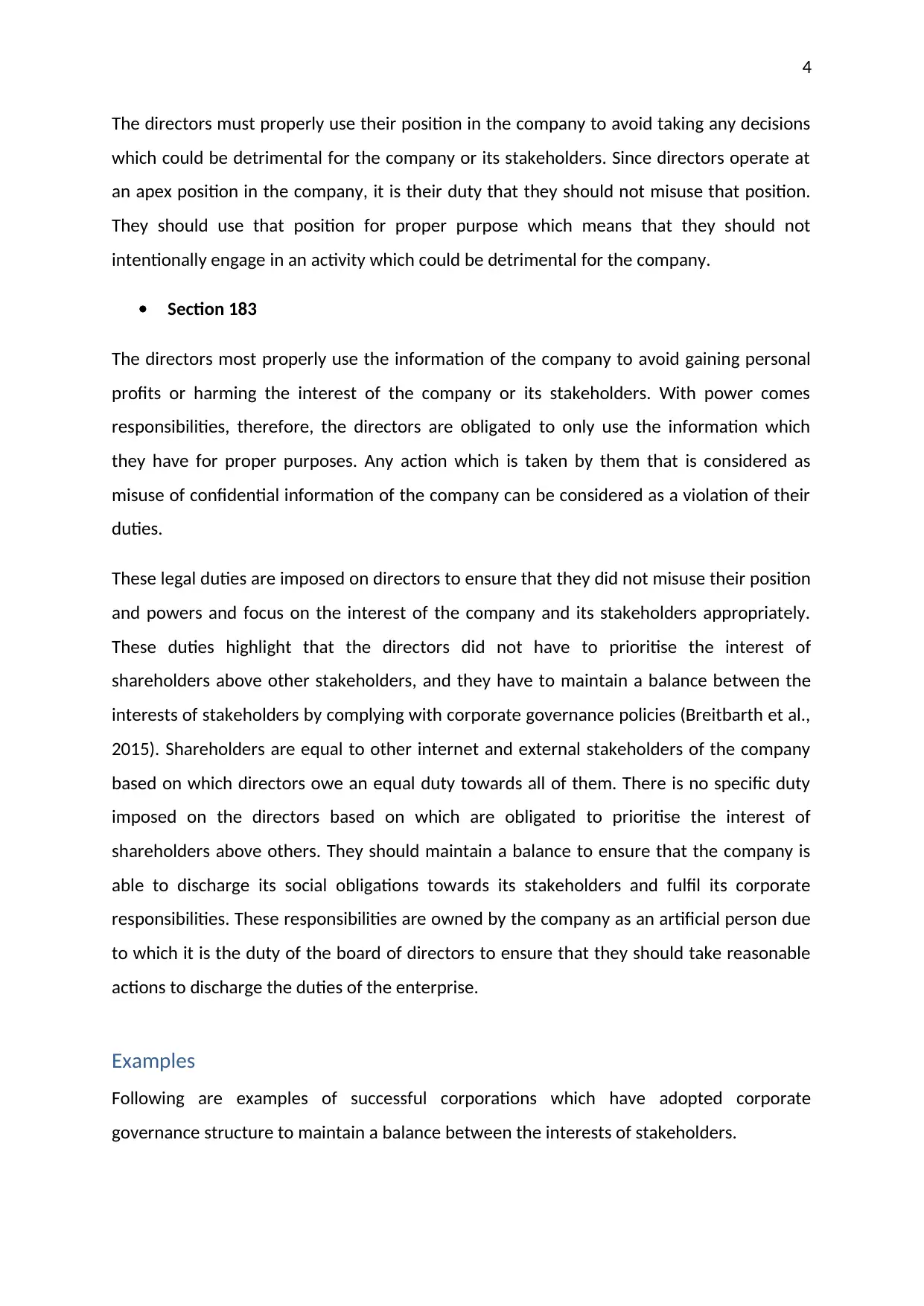
4
The directors must properly use their position in the company to avoid taking any decisions
which could be detrimental for the company or its stakeholders. Since directors operate at
an apex position in the company, it is their duty that they should not misuse that position.
They should use that position for proper purpose which means that they should not
intentionally engage in an activity which could be detrimental for the company.
Section 183
The directors most properly use the information of the company to avoid gaining personal
profits or harming the interest of the company or its stakeholders. With power comes
responsibilities, therefore, the directors are obligated to only use the information which
they have for proper purposes. Any action which is taken by them that is considered as
misuse of confidential information of the company can be considered as a violation of their
duties.
These legal duties are imposed on directors to ensure that they did not misuse their position
and powers and focus on the interest of the company and its stakeholders appropriately.
These duties highlight that the directors did not have to prioritise the interest of
shareholders above other stakeholders, and they have to maintain a balance between the
interests of stakeholders by complying with corporate governance policies (Breitbarth et al.,
2015). Shareholders are equal to other internet and external stakeholders of the company
based on which directors owe an equal duty towards all of them. There is no specific duty
imposed on the directors based on which are obligated to prioritise the interest of
shareholders above others. They should maintain a balance to ensure that the company is
able to discharge its social obligations towards its stakeholders and fulfil its corporate
responsibilities. These responsibilities are owned by the company as an artificial person due
to which it is the duty of the board of directors to ensure that they should take reasonable
actions to discharge the duties of the enterprise.
Examples
Following are examples of successful corporations which have adopted corporate
governance structure to maintain a balance between the interests of stakeholders.
The directors must properly use their position in the company to avoid taking any decisions
which could be detrimental for the company or its stakeholders. Since directors operate at
an apex position in the company, it is their duty that they should not misuse that position.
They should use that position for proper purpose which means that they should not
intentionally engage in an activity which could be detrimental for the company.
Section 183
The directors most properly use the information of the company to avoid gaining personal
profits or harming the interest of the company or its stakeholders. With power comes
responsibilities, therefore, the directors are obligated to only use the information which
they have for proper purposes. Any action which is taken by them that is considered as
misuse of confidential information of the company can be considered as a violation of their
duties.
These legal duties are imposed on directors to ensure that they did not misuse their position
and powers and focus on the interest of the company and its stakeholders appropriately.
These duties highlight that the directors did not have to prioritise the interest of
shareholders above other stakeholders, and they have to maintain a balance between the
interests of stakeholders by complying with corporate governance policies (Breitbarth et al.,
2015). Shareholders are equal to other internet and external stakeholders of the company
based on which directors owe an equal duty towards all of them. There is no specific duty
imposed on the directors based on which are obligated to prioritise the interest of
shareholders above others. They should maintain a balance to ensure that the company is
able to discharge its social obligations towards its stakeholders and fulfil its corporate
responsibilities. These responsibilities are owned by the company as an artificial person due
to which it is the duty of the board of directors to ensure that they should take reasonable
actions to discharge the duties of the enterprise.
Examples
Following are examples of successful corporations which have adopted corporate
governance structure to maintain a balance between the interests of stakeholders.
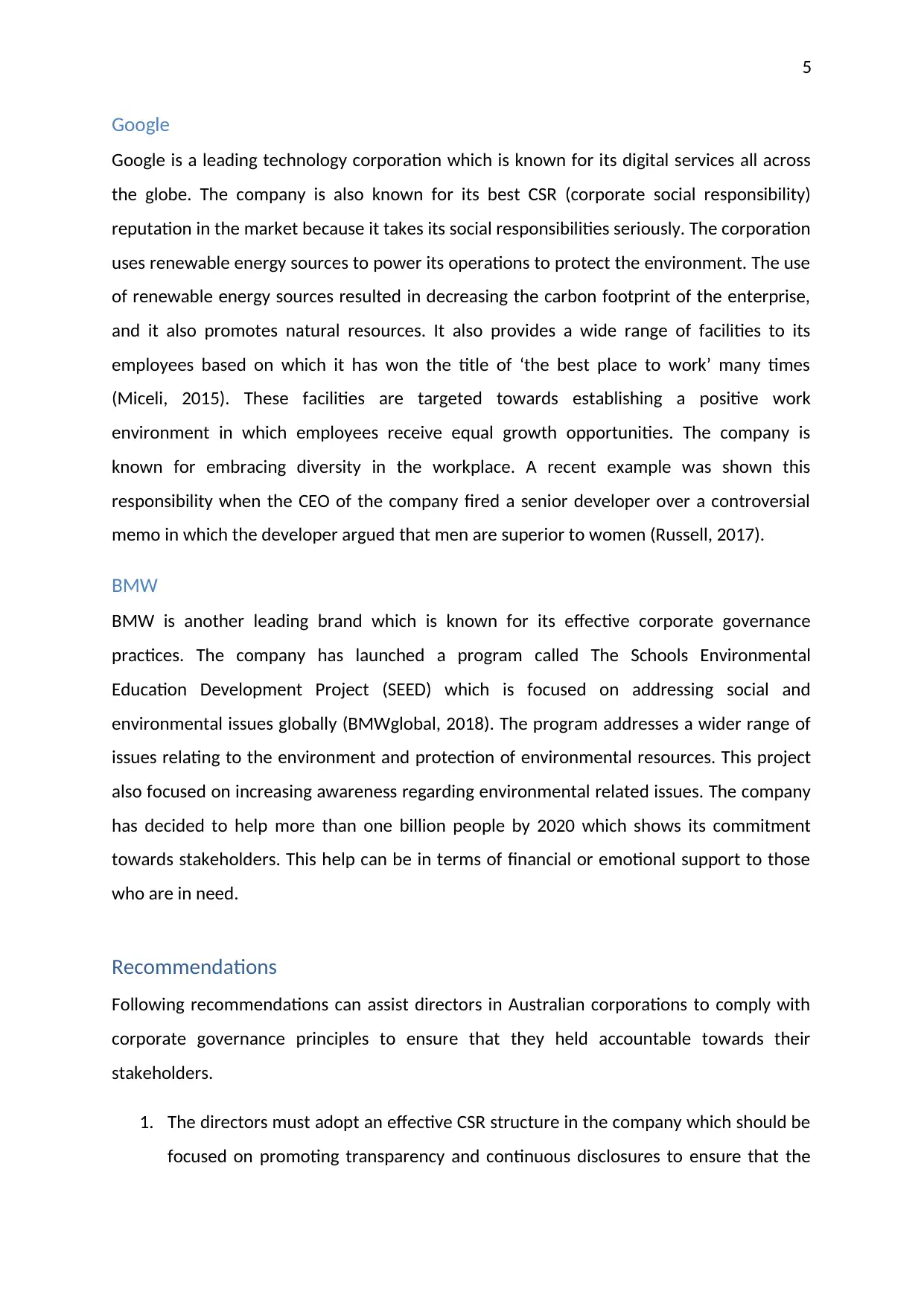
5
Google
Google is a leading technology corporation which is known for its digital services all across
the globe. The company is also known for its best CSR (corporate social responsibility)
reputation in the market because it takes its social responsibilities seriously. The corporation
uses renewable energy sources to power its operations to protect the environment. The use
of renewable energy sources resulted in decreasing the carbon footprint of the enterprise,
and it also promotes natural resources. It also provides a wide range of facilities to its
employees based on which it has won the title of ‘the best place to work’ many times
(Miceli, 2015). These facilities are targeted towards establishing a positive work
environment in which employees receive equal growth opportunities. The company is
known for embracing diversity in the workplace. A recent example was shown this
responsibility when the CEO of the company fired a senior developer over a controversial
memo in which the developer argued that men are superior to women (Russell, 2017).
BMW
BMW is another leading brand which is known for its effective corporate governance
practices. The company has launched a program called The Schools Environmental
Education Development Project (SEED) which is focused on addressing social and
environmental issues globally (BMWglobal, 2018). The program addresses a wider range of
issues relating to the environment and protection of environmental resources. This project
also focused on increasing awareness regarding environmental related issues. The company
has decided to help more than one billion people by 2020 which shows its commitment
towards stakeholders. This help can be in terms of financial or emotional support to those
who are in need.
Recommendations
Following recommendations can assist directors in Australian corporations to comply with
corporate governance principles to ensure that they held accountable towards their
stakeholders.
1. The directors must adopt an effective CSR structure in the company which should be
focused on promoting transparency and continuous disclosures to ensure that the
Google is a leading technology corporation which is known for its digital services all across
the globe. The company is also known for its best CSR (corporate social responsibility)
reputation in the market because it takes its social responsibilities seriously. The corporation
uses renewable energy sources to power its operations to protect the environment. The use
of renewable energy sources resulted in decreasing the carbon footprint of the enterprise,
and it also promotes natural resources. It also provides a wide range of facilities to its
employees based on which it has won the title of ‘the best place to work’ many times
(Miceli, 2015). These facilities are targeted towards establishing a positive work
environment in which employees receive equal growth opportunities. The company is
known for embracing diversity in the workplace. A recent example was shown this
responsibility when the CEO of the company fired a senior developer over a controversial
memo in which the developer argued that men are superior to women (Russell, 2017).
BMW
BMW is another leading brand which is known for its effective corporate governance
practices. The company has launched a program called The Schools Environmental
Education Development Project (SEED) which is focused on addressing social and
environmental issues globally (BMWglobal, 2018). The program addresses a wider range of
issues relating to the environment and protection of environmental resources. This project
also focused on increasing awareness regarding environmental related issues. The company
has decided to help more than one billion people by 2020 which shows its commitment
towards stakeholders. This help can be in terms of financial or emotional support to those
who are in need.
Recommendations
Following recommendations can assist directors in Australian corporations to comply with
corporate governance principles to ensure that they held accountable towards their
stakeholders.
1. The directors must adopt an effective CSR structure in the company which should be
focused on promoting transparency and continuous disclosures to ensure that the
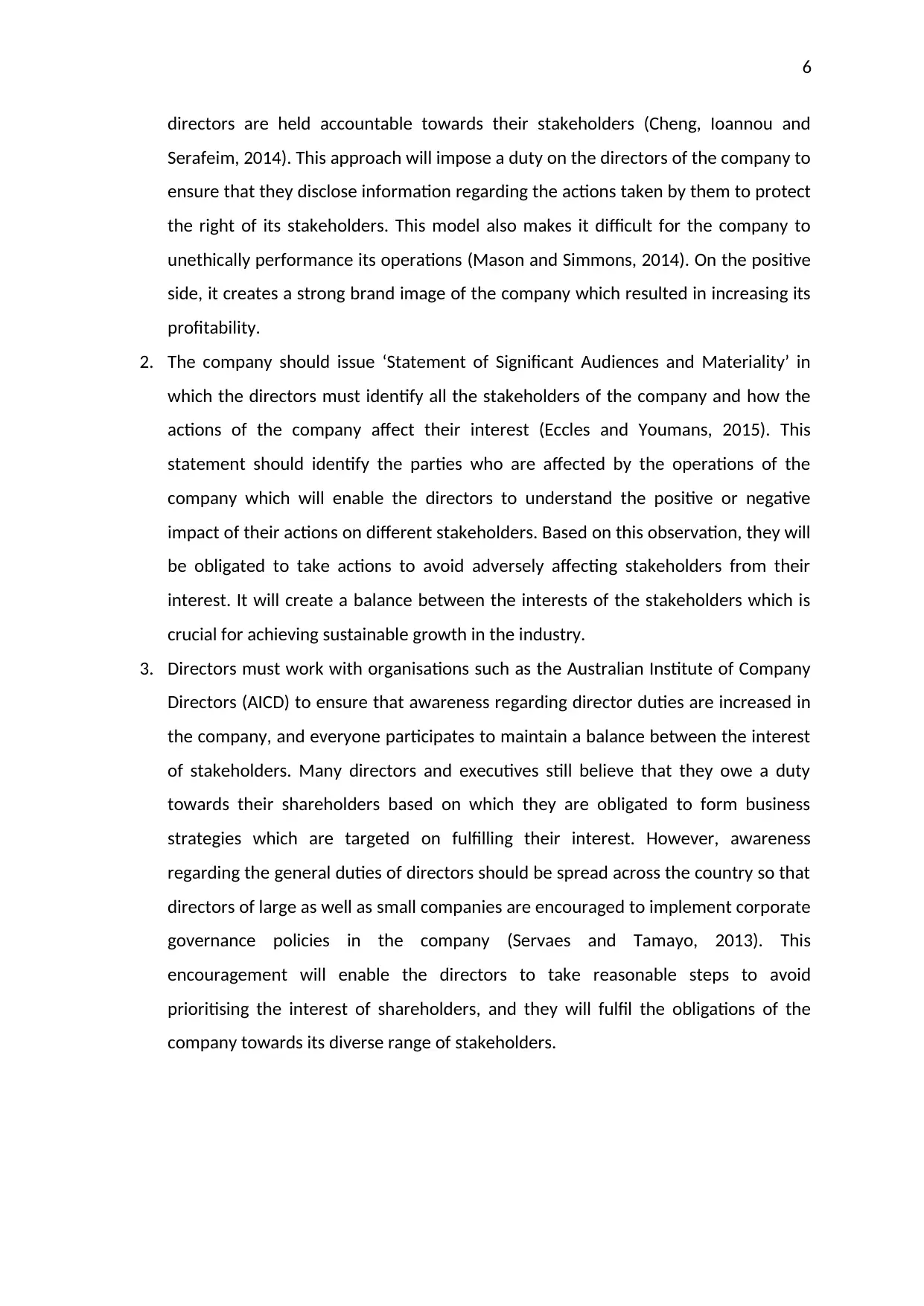
6
directors are held accountable towards their stakeholders (Cheng, Ioannou and
Serafeim, 2014). This approach will impose a duty on the directors of the company to
ensure that they disclose information regarding the actions taken by them to protect
the right of its stakeholders. This model also makes it difficult for the company to
unethically performance its operations (Mason and Simmons, 2014). On the positive
side, it creates a strong brand image of the company which resulted in increasing its
profitability.
2. The company should issue ‘Statement of Significant Audiences and Materiality’ in
which the directors must identify all the stakeholders of the company and how the
actions of the company affect their interest (Eccles and Youmans, 2015). This
statement should identify the parties who are affected by the operations of the
company which will enable the directors to understand the positive or negative
impact of their actions on different stakeholders. Based on this observation, they will
be obligated to take actions to avoid adversely affecting stakeholders from their
interest. It will create a balance between the interests of the stakeholders which is
crucial for achieving sustainable growth in the industry.
3. Directors must work with organisations such as the Australian Institute of Company
Directors (AICD) to ensure that awareness regarding director duties are increased in
the company, and everyone participates to maintain a balance between the interest
of stakeholders. Many directors and executives still believe that they owe a duty
towards their shareholders based on which they are obligated to form business
strategies which are targeted on fulfilling their interest. However, awareness
regarding the general duties of directors should be spread across the country so that
directors of large as well as small companies are encouraged to implement corporate
governance policies in the company (Servaes and Tamayo, 2013). This
encouragement will enable the directors to take reasonable steps to avoid
prioritising the interest of shareholders, and they will fulfil the obligations of the
company towards its diverse range of stakeholders.
directors are held accountable towards their stakeholders (Cheng, Ioannou and
Serafeim, 2014). This approach will impose a duty on the directors of the company to
ensure that they disclose information regarding the actions taken by them to protect
the right of its stakeholders. This model also makes it difficult for the company to
unethically performance its operations (Mason and Simmons, 2014). On the positive
side, it creates a strong brand image of the company which resulted in increasing its
profitability.
2. The company should issue ‘Statement of Significant Audiences and Materiality’ in
which the directors must identify all the stakeholders of the company and how the
actions of the company affect their interest (Eccles and Youmans, 2015). This
statement should identify the parties who are affected by the operations of the
company which will enable the directors to understand the positive or negative
impact of their actions on different stakeholders. Based on this observation, they will
be obligated to take actions to avoid adversely affecting stakeholders from their
interest. It will create a balance between the interests of the stakeholders which is
crucial for achieving sustainable growth in the industry.
3. Directors must work with organisations such as the Australian Institute of Company
Directors (AICD) to ensure that awareness regarding director duties are increased in
the company, and everyone participates to maintain a balance between the interest
of stakeholders. Many directors and executives still believe that they owe a duty
towards their shareholders based on which they are obligated to form business
strategies which are targeted on fulfilling their interest. However, awareness
regarding the general duties of directors should be spread across the country so that
directors of large as well as small companies are encouraged to implement corporate
governance policies in the company (Servaes and Tamayo, 2013). This
encouragement will enable the directors to take reasonable steps to avoid
prioritising the interest of shareholders, and they will fulfil the obligations of the
company towards its diverse range of stakeholders.
Paraphrase This Document
Need a fresh take? Get an instant paraphrase of this document with our AI Paraphraser
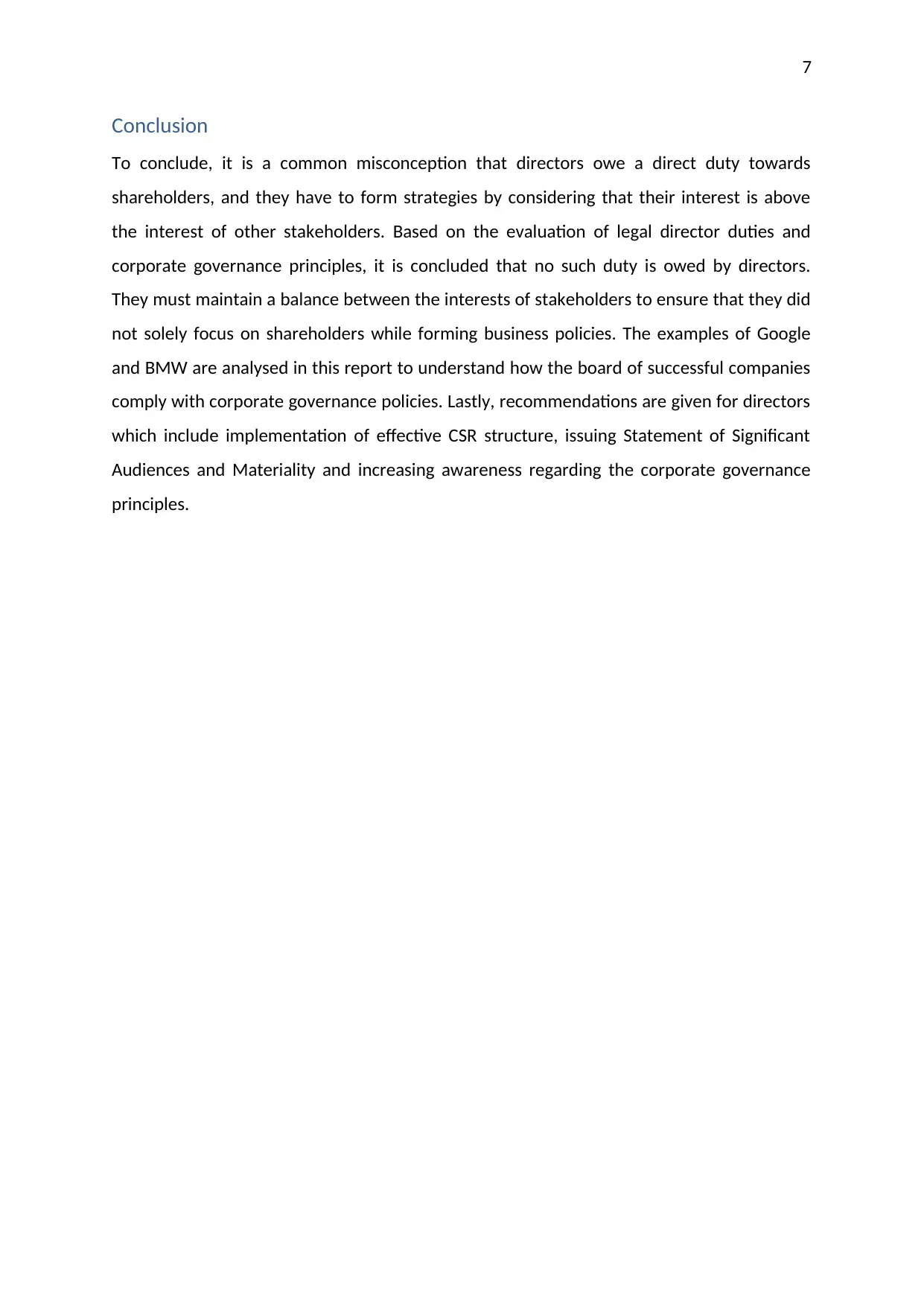
7
Conclusion
To conclude, it is a common misconception that directors owe a direct duty towards
shareholders, and they have to form strategies by considering that their interest is above
the interest of other stakeholders. Based on the evaluation of legal director duties and
corporate governance principles, it is concluded that no such duty is owed by directors.
They must maintain a balance between the interests of stakeholders to ensure that they did
not solely focus on shareholders while forming business policies. The examples of Google
and BMW are analysed in this report to understand how the board of successful companies
comply with corporate governance policies. Lastly, recommendations are given for directors
which include implementation of effective CSR structure, issuing Statement of Significant
Audiences and Materiality and increasing awareness regarding the corporate governance
principles.
Conclusion
To conclude, it is a common misconception that directors owe a direct duty towards
shareholders, and they have to form strategies by considering that their interest is above
the interest of other stakeholders. Based on the evaluation of legal director duties and
corporate governance principles, it is concluded that no such duty is owed by directors.
They must maintain a balance between the interests of stakeholders to ensure that they did
not solely focus on shareholders while forming business policies. The examples of Google
and BMW are analysed in this report to understand how the board of successful companies
comply with corporate governance policies. Lastly, recommendations are given for directors
which include implementation of effective CSR structure, issuing Statement of Significant
Audiences and Materiality and increasing awareness regarding the corporate governance
principles.
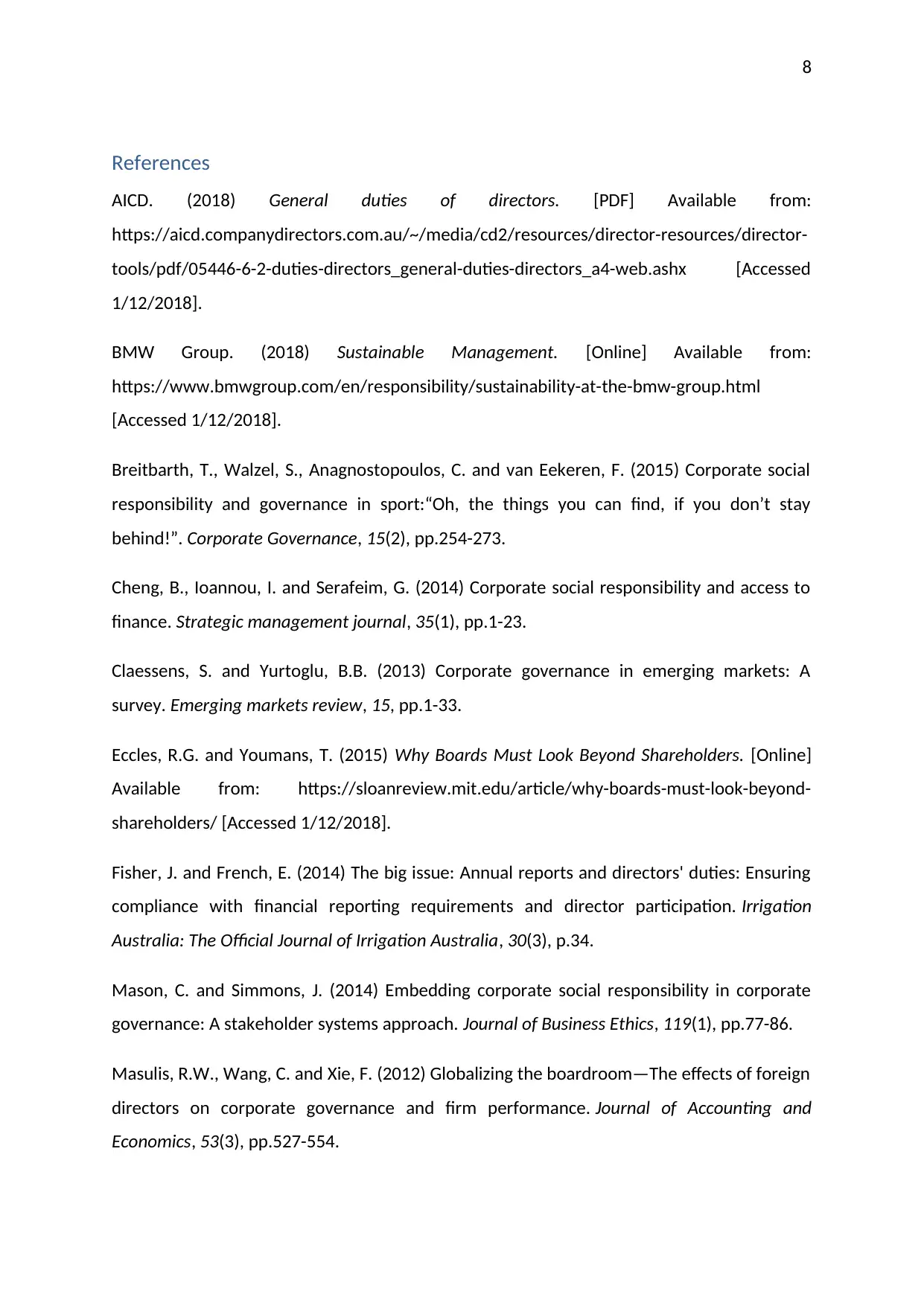
8
References
AICD. (2018) General duties of directors. [PDF] Available from:
https://aicd.companydirectors.com.au/~/media/cd2/resources/director-resources/director-
tools/pdf/05446-6-2-duties-directors_general-duties-directors_a4-web.ashx [Accessed
1/12/2018].
BMW Group. (2018) Sustainable Management. [Online] Available from:
https://www.bmwgroup.com/en/responsibility/sustainability-at-the-bmw-group.html
[Accessed 1/12/2018].
Breitbarth, T., Walzel, S., Anagnostopoulos, C. and van Eekeren, F. (2015) Corporate social
responsibility and governance in sport:“Oh, the things you can find, if you don’t stay
behind!”. Corporate Governance, 15(2), pp.254-273.
Cheng, B., Ioannou, I. and Serafeim, G. (2014) Corporate social responsibility and access to
finance. Strategic management journal, 35(1), pp.1-23.
Claessens, S. and Yurtoglu, B.B. (2013) Corporate governance in emerging markets: A
survey. Emerging markets review, 15, pp.1-33.
Eccles, R.G. and Youmans, T. (2015) Why Boards Must Look Beyond Shareholders. [Online]
Available from: https://sloanreview.mit.edu/article/why-boards-must-look-beyond-
shareholders/ [Accessed 1/12/2018].
Fisher, J. and French, E. (2014) The big issue: Annual reports and directors' duties: Ensuring
compliance with financial reporting requirements and director participation. Irrigation
Australia: The Official Journal of Irrigation Australia, 30(3), p.34.
Mason, C. and Simmons, J. (2014) Embedding corporate social responsibility in corporate
governance: A stakeholder systems approach. Journal of Business Ethics, 119(1), pp.77-86.
Masulis, R.W., Wang, C. and Xie, F. (2012) Globalizing the boardroom—The effects of foreign
directors on corporate governance and firm performance. Journal of Accounting and
Economics, 53(3), pp.527-554.
References
AICD. (2018) General duties of directors. [PDF] Available from:
https://aicd.companydirectors.com.au/~/media/cd2/resources/director-resources/director-
tools/pdf/05446-6-2-duties-directors_general-duties-directors_a4-web.ashx [Accessed
1/12/2018].
BMW Group. (2018) Sustainable Management. [Online] Available from:
https://www.bmwgroup.com/en/responsibility/sustainability-at-the-bmw-group.html
[Accessed 1/12/2018].
Breitbarth, T., Walzel, S., Anagnostopoulos, C. and van Eekeren, F. (2015) Corporate social
responsibility and governance in sport:“Oh, the things you can find, if you don’t stay
behind!”. Corporate Governance, 15(2), pp.254-273.
Cheng, B., Ioannou, I. and Serafeim, G. (2014) Corporate social responsibility and access to
finance. Strategic management journal, 35(1), pp.1-23.
Claessens, S. and Yurtoglu, B.B. (2013) Corporate governance in emerging markets: A
survey. Emerging markets review, 15, pp.1-33.
Eccles, R.G. and Youmans, T. (2015) Why Boards Must Look Beyond Shareholders. [Online]
Available from: https://sloanreview.mit.edu/article/why-boards-must-look-beyond-
shareholders/ [Accessed 1/12/2018].
Fisher, J. and French, E. (2014) The big issue: Annual reports and directors' duties: Ensuring
compliance with financial reporting requirements and director participation. Irrigation
Australia: The Official Journal of Irrigation Australia, 30(3), p.34.
Mason, C. and Simmons, J. (2014) Embedding corporate social responsibility in corporate
governance: A stakeholder systems approach. Journal of Business Ethics, 119(1), pp.77-86.
Masulis, R.W., Wang, C. and Xie, F. (2012) Globalizing the boardroom—The effects of foreign
directors on corporate governance and firm performance. Journal of Accounting and
Economics, 53(3), pp.527-554.
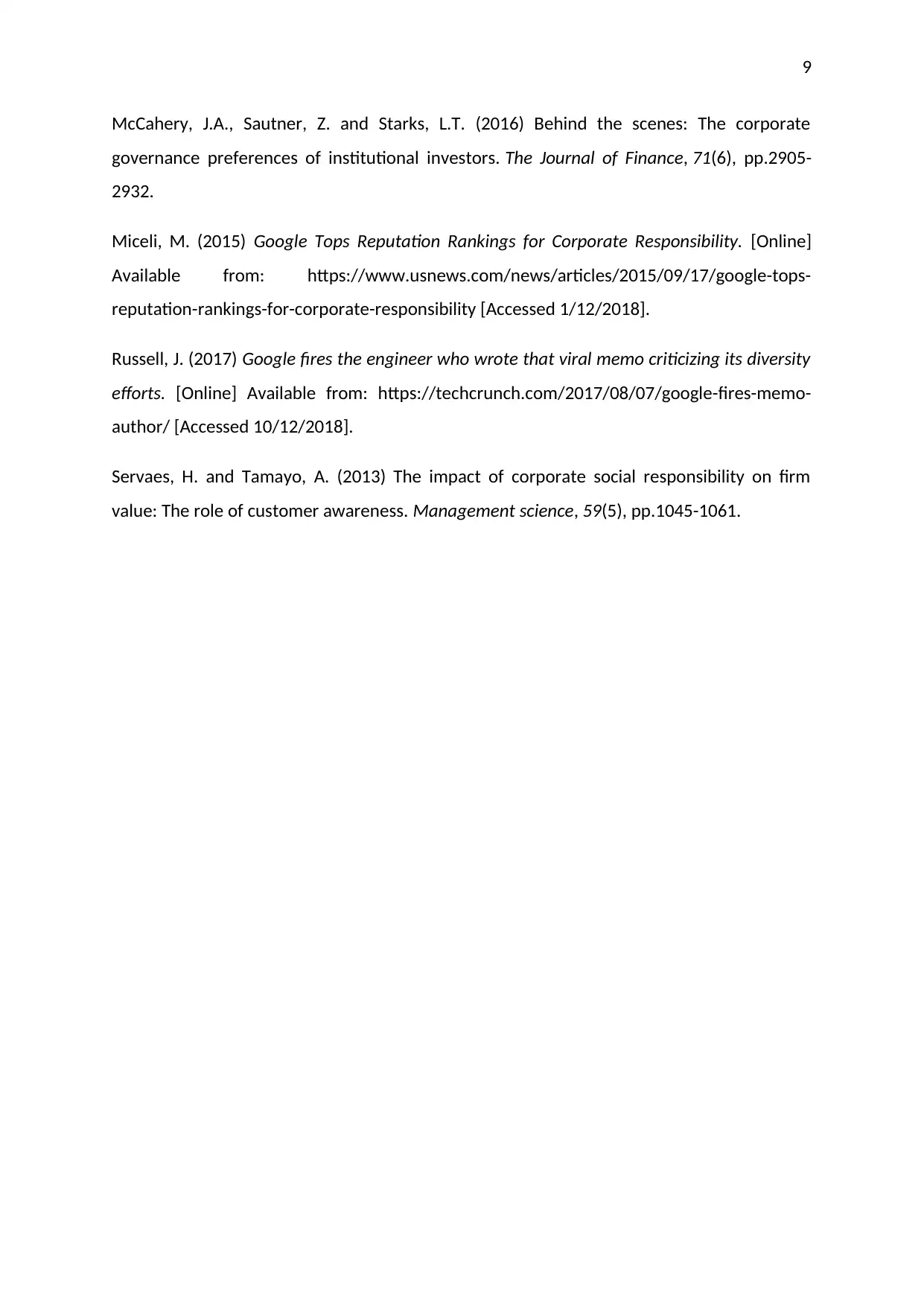
9
McCahery, J.A., Sautner, Z. and Starks, L.T. (2016) Behind the scenes: The corporate
governance preferences of institutional investors. The Journal of Finance, 71(6), pp.2905-
2932.
Miceli, M. (2015) Google Tops Reputation Rankings for Corporate Responsibility. [Online]
Available from: https://www.usnews.com/news/articles/2015/09/17/google-tops-
reputation-rankings-for-corporate-responsibility [Accessed 1/12/2018].
Russell, J. (2017) Google fires the engineer who wrote that viral memo criticizing its diversity
efforts. [Online] Available from: https://techcrunch.com/2017/08/07/google-fires-memo-
author/ [Accessed 10/12/2018].
Servaes, H. and Tamayo, A. (2013) The impact of corporate social responsibility on firm
value: The role of customer awareness. Management science, 59(5), pp.1045-1061.
McCahery, J.A., Sautner, Z. and Starks, L.T. (2016) Behind the scenes: The corporate
governance preferences of institutional investors. The Journal of Finance, 71(6), pp.2905-
2932.
Miceli, M. (2015) Google Tops Reputation Rankings for Corporate Responsibility. [Online]
Available from: https://www.usnews.com/news/articles/2015/09/17/google-tops-
reputation-rankings-for-corporate-responsibility [Accessed 1/12/2018].
Russell, J. (2017) Google fires the engineer who wrote that viral memo criticizing its diversity
efforts. [Online] Available from: https://techcrunch.com/2017/08/07/google-fires-memo-
author/ [Accessed 10/12/2018].
Servaes, H. and Tamayo, A. (2013) The impact of corporate social responsibility on firm
value: The role of customer awareness. Management science, 59(5), pp.1045-1061.
1 out of 10
Related Documents
Your All-in-One AI-Powered Toolkit for Academic Success.
+13062052269
info@desklib.com
Available 24*7 on WhatsApp / Email
![[object Object]](/_next/static/media/star-bottom.7253800d.svg)
Unlock your academic potential
© 2024 | Zucol Services PVT LTD | All rights reserved.




